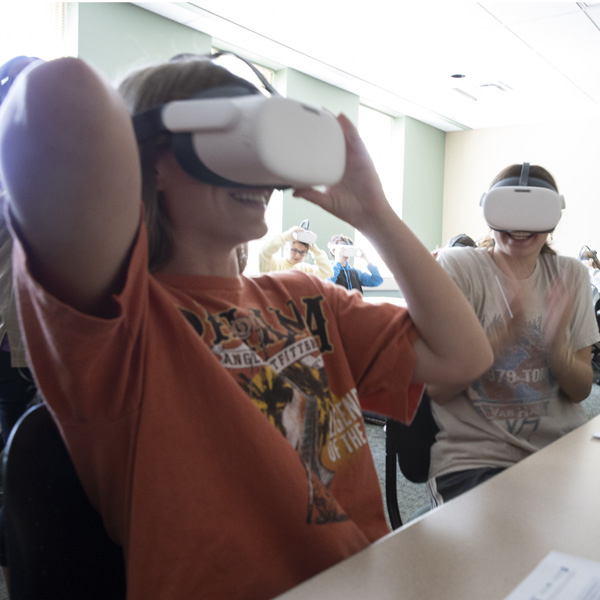Immersive VR tech transforms how Miami trains the next generation of Social Workers
Through lifelike VR case studies, students learn to see, listen, and respond with empathy while building real-world decision-making skills
Immersive VR tech transforms how Miami trains the next generation of Social Workers
Video by Zach Burnett
Being a social worker is often about stepping into someone else’s world. It’s about seeing what they see, feeling what they feel, and noticing what others might miss, while also helping them work through personal problems with empathy and purpose.
So what if students training to become social workers could witness the quiet, but important moments that often happen behind closed doors — the subtle tensions and invisible cues that often reveal the deeper challenges that someone might face?
And what if it wasn’t just possible, but already happening?
In a groundbreaking fusion of empathy and innovation, Social Work students at Miami University are stepping directly into immersive training scenarios using virtual reality. And it’s helping them better understand nuance, read social cues, and practice clinical decision-making in hyper-realistic educational environments.
“In these experiences, the students feel like they are actually right there,” said Amy Restorick Roberts, associate professor in the Department of Family Science and Social Work (FSW). “They are observing things that are very personal, and it really helps to give them perspective in terms of what they may encounter in the practice, and how they can better assess different situations and know the appropriate interventions to use.”

During the in-class exercise, students experienced five separate modules covering different interactions between an older adult, his family, and other healthcare professionals. Each presented a highly-detailed and unfiltered look at interactions and cultural differences between family members, various living conditions, conversations in the car going to and from healthcare offices, glimpses into medical appointments, and more.
After each module, students were able to discuss and debrief what they collectively experienced as a class.
“It was just like you were able to be there and be in that situation,” said Social Work major Sophia Parimuha. “We were able to see things and hear things like their facial expressions and tone of voice. It really gave you more background information. And it helps you a lot more than just reading words on a page.”
The VR equipment was acquired using part of a $1.55M grant from the Southern Ohio Behavioral Health Initiative (SOBHI), which was awarded as part of a collaboration between Miami University and Ohio University to address the need for behavioral health professionals in underserved communities across Southern Ohio.
The technology was first deployed as part of Miami’s Summer Scholars Program earlier this year by Brandy Jones, assistant clinical professor. Since then, additional FSW faculty, including Scott Osterfeld have also helped integrate the technology into the department.
“These students who are able to view these case scenarios are getting those real-life experiences that many social workers don't get until they're really out in the field,” said Jones. “And that adds to not only them developing empathy for their clients, but also allows them to see what real social workers are doing in their roles.”
In addition to increasing both empathy and confidence by bringing these case studies to life in a way that no traditional educational methods could, Roberts said the experience is substantially increasing classroom engagement as well, and it also portends even more exciting possibilities for the future.
“It really does increase the willingness of students to participate and think critically in formulating their responses,” she said. “They are very comfortable sharing their thoughts, ideas, and impressions because the lifelike client scenarios provide the context for them to begin to use their professional voice. This opens up tremendous opportunities for how we train future social workers in building empathy, confidence, and professional judgment.”
Soon the FSW plans to expand its VR opportunities across the department to include more undergraduate and graduate level curriculum offerings.